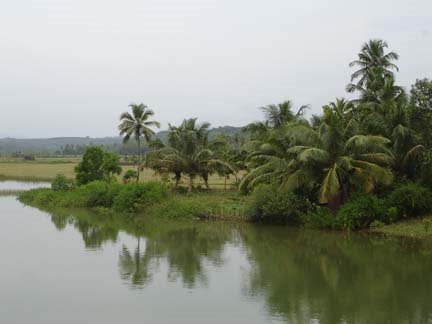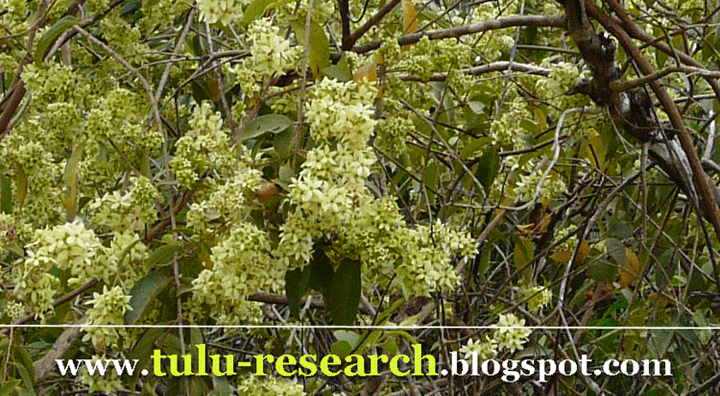We were discussing in the previous posts about some of the primitive or ancient words that possibly found entry into other regions during the process of migration of human tribes in the antiquity. The ancient words might have inadvertently lost their original identity and meaning with passage of time in the new environment. One such possible African word existing in the present Dravidian socio-cultural setup is the word ‘Mungo’.
Mungo
‘Mungo’ is the name of an African God of Rain. We can presume that the ancient African word ‘Mung’ is related to rains. Let us analyze the derived or related words in Dravidian languages like Tulu and Kannada.
Mungaru
‘Mungāru’ is a common Tulu and Kannada word for the major annual rainfall of the region, which we have also designated alternately as ’Southwest Monsoon’.
(The word ‘mungār’ has also two other meanings especially in Tulu, namely: (1) the front portion of the leg and (2) a hammer. But presently let us not go to digressing details.)
In the present context, we have presumed that ‘Mungaru’ is derived as follows:
Mun + karu, where ‘mun’= advance or advancing and ‘karu’= clouds and rains.
As a corollary, our people have created an antonym like ‘hingaru’ (hin + karu) in the similar lines to represent the second session of rains in the southern India, namely the ‘Northwest Monsoon’.
But some analysis of the word ‘kār’ or ‘kāru’ suggests that it represents dark (like a dark dense forest or dark clouds) and not the rains. Thus, we realize that ‘kār’=rains is only an assumed meaning.
If we go back to the possible original derivation from the African word ‘mung’ for rain,
Mung + aru= splash of rains. (Tulu word: ‘ār’ as in ‘aral’=splashing of shower, as in the phrase ‘aral beejuni’.)
Munge
Another Tulu word that retains the African root ‘mung’ (=rain) is ‘munge’(=sprout). It is common knowledge that rains induce sprouting in seeds kept in the open.
Mung+e. = growth (sprouting) due to rain.
There is another route for confirming the above origin of the word:
In Kannada the word ‘munge’ does not exist (at least presently) but is replaced by another similar word known as ‘moLake’ (=sprout). The word ‘moLake’ must have been a modified version of the original word ‘maLake’(=sprouting induced by rains), because: In the usage male + ke where ‘maLe’ stands for rain.
Mungāv
There is one more related word in Tulu, namely ‘mungā’, ‘mungāv’ or ‘mungo’ which means to submerge or dip in water.
®
Saturday, December 19, 2009
Subscribe to:
Post Comments (Atom)
Blog Archive
Books for Reference
- A Comparative Study of Tulu Dialects By Dr. Padmanabha Kekunnaya. Govinda Pai Reserach Centre, UDupi. 1994
- Koti Chennaya: Janapadiya Adhyayana. By Dr. Vamana Nandavar. Hemanshu Prakashana ,Mangalore.2001.
- Male kudiyaru. Dr B. A.Viveka Rai and D.Yadupathi Gowda, Mangalore University,1996.
- Mogaveera Samskriti By Venkataraja Punimchattaya. Karnataka Sahitya Academy.1993.
- Mugeraru:Jananga Janapada Adhyayana. By Dr Abhaya Kumar Kaukradi.Kannada & Culture Directorate,Bangalore & Karnataka Tulu Academy, Mangalore,1997.
- Puttubalakeya Pad-danagalu. Ed: Dr B.A.Viveka Rai,Yadupati Gowda and Rajashri, Sri Dharmasthala Manjunatheswara Tulu Peeta. Mangalore University.2004
- Se'erige. Ed:Dr K.Chinnapa Gowda.Madipu Prakashana,Mangalagangotri,2000.
- Studies in Tuluva History and Culture.by Dr P Gururaja Bhat (1975).Milagres College,Kallinapur,Udupi.
- Taulava Sanskriti by Dr.B.A.Viveka Rai, Sahyadri Prakashana,Mysore 1977
- TuLu naaDu-nuDi By Dr.PalthaDi Ramakrishna Achar, Puttur.
- TuLu NighanTu. (Editor in Chief: Dr U.P.Upadhyaya, Govinda Pai Research Centre,Udupi. Six volumes. 1988 to 1997
- Tulu Patero-A Philology & Grammar of Tulu Language by Budhananda Shivalli.2004.Mandira Prakashana Mangalore. p.317. (The book is in Tulu Language using Kannada script)
- TuLunadina ShasanagaLa Sanskritika Adhyayana. By Shaila T. Verma (2002) Jnanodaya Prakashana,Bangalore, p.304.(Kannada)
- Tuluvala Baliyendre. Compiled by N.A.Sheenappa Hegde,Polali,Sri Devi Prakashana,Parkala,1929/1999
* Landscape images *
A Coastal estuary

Holegadde near Honavar,Uttara Kannada dist, Karnataka
Copy? Right - but kindly remember to acknowledge!
" tulu-research.blogspot." ತುಳು ರಿಸರ್ಚ್. ಬ್ಲಾಗ್ಸ್ಪಾಟ್. ಇನ್

Have a nice day !

No comments:
Post a Comment